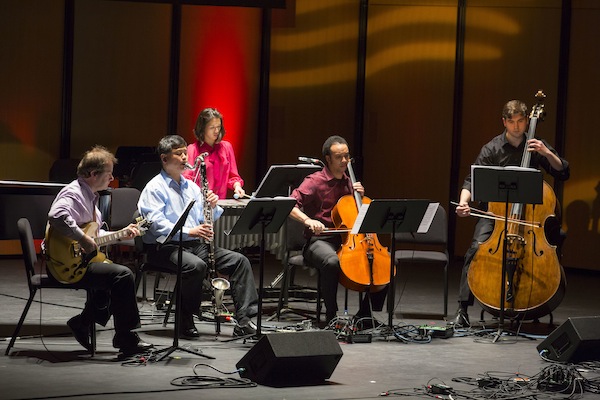MusicNOW’s mixed techno program could use more blood

The Chicago Symphony Orchestra’s second MusicNOW event of the season offered a typically varied mix of worthy and numbing compositions Monday night at the Harris Theater.
In the former category was Anna Clyne’s A Wonderful Day, a work characteristic of the CSO composer in residence’s mix of electronic elements and live performance. Clyne recorded an elderly man (Wooly Barbee) she happened to encounter walking down Michigan Avenue, singing in a worn yet hearty voice. In her piece Clyne runs a loop of the man’s song and conversation against a live amplified sextet.
The effect is mesmerizing, with the dark-colored instruments (cello, bass, bass clarinet, guitar, piano and percussion) providing a warm, pliable foundation for Barbee’s joyous vocalizing. The scoring is deftly varied with each iteration and at just five minutes, A Wonderful Day is a small gem.
It was good to see a previous generation of composers represented Monday, with music of Salvatore Sciarrino. The 67-year-old Italian’s Ai limiti della notte for amplified solo viola is typical of his style, finding a bracing array of acutely varied hues and highly calibrated dynamics within a circumscribed range. Weijing Wang delivered a compelling, highly concentrated reading.
If the concise Clyne and Sciarrino works showed that less can be more, the first two works on the program showed that more can definitely be less.
DJ Justin Reed has provided the ambient electronic lobby sounds for previous MusicNOW events. But, as shown by the world premiere of his Hommage a Scriabin, being a “turntablist” and manipulating electronic sounds doesn’t make one a composer.
Heard in its world premiere, this MusicNow commission was inspired by Scriabin’s synesthesia, the gift (or malady) of seeing colors in relation to music. (Scriabin famously planned a “color organ” to accompany his Prometheus: The Poem of Fire.)
While Todd Clark’s mutable, iridescent projections evoked something of Scriabin’s multimedia sensualism, Reed’s music was an aimless and overlong array of electronic bloops and blips with snatches of Scriabin piano music flitting by. The baseball cap-wearing composer solemnly manned a double deck of turntables and electronica, yet the plugged-in effects frequently resulted in crackling distortion from the Harris sound system.
Another electronic work, Dan Trueman’s 120bpm calls for four percussionists to perform on drums and metal percussion as well as “digital metronomes” that are reset whenever the players hit wooden blocks. The varied timbres are initially engaging but the repetitive rhythms quickly become less interesting over the 16-minute span. Like many works heard at MusicNOW programs in the Bates-Clyne era, 120bpm seems like it was more intriguing to create and perform than to listen to. By the time the players are called upon to lay down their sticks and engage in tai chi-like stretching exercises, audience interest had left the building.
After the foregoing, the rich string themes of Jonny Greenwood’s score for There Will Be Blood sounded like Rachmaninoff. The Radiohead guitarist has made a graceful and successful transition into classical composing, most notably with his music for Paul Thomas Anderson’s 2007 film.
Scored for oboe and string ensemble, the 20-minute suite Greenwood drew from his score offers pensive, darkly lyrical music along with agitated riffs and biting accents that reflect something of the unhinged ambition of the film’s protagonist, Daniel Plainview (played by Daniel Day-Lewis in an Oscar-winning performance).
With precise direction, conductor Donato Cabrera drew a taut, highly responsive performance eliciting rich, luminous tone from the ensemble—made up largely of CSO members—and providing fine advocacy for Greenwood’s distinctive score.
Posted in Performances

